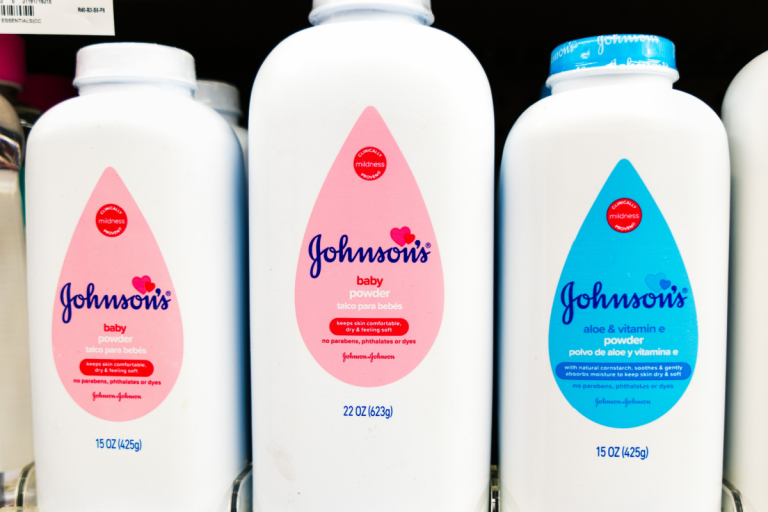Pharmaceutical giant Johnson & Johnson (J&J) is facing a massive legal claim in the UK accusing the company of knowingly selling asbestos-contaminated baby powder for decades. The case, filed by KP Law on behalf of 3,000 claimants, could become the largest product liability lawsuit in British history, with damages potentially reaching hundreds of millions of pounds.
Court documents reviewed by the BBC cite internal J&J memos and scientific reports dating back to the 1960s. The evidence allegedly shows that the company was aware its talc products contained fibrous minerals such as tremolite and actinolite — forms of asbestos linked to deadly cancers — but failed to disclose this to consumers.
Allegations of Concealment and Misleading Marketing
The lawsuit claims that instead of issuing warnings, J&J marketed its baby powder as a symbol of purity and safety, targeting mothers and later women of color. The plaintiffs allege that the company’s internal communications reveal a long-standing effort to conceal potential health risks while maximizing profits.
A 1973 internal document allegedly acknowledged trace asbestos fibers in the powder, stating: “Our baby powder contains talc fragments classifiable as fiber… Occasionally sub-trace quantities of tremolite or actinolite are identifiable.” Another memo from the same year advised keeping this information confidential, saying, “We may wish to keep the whole thing confidential rather than let the whole world know.”
Kenvue Ltd, J&J’s consumer health spin-off and co-defendant, said the discussion was about patent confidentiality, not concealment. The company insists that its talc products “did not contain asbestos and do not cause cancer,” citing independent lab tests and regulatory compliance.
Testing Standards and Regulatory Pressure
The claim further alleges that J&J pressured the U.S. Food and Drug Administration (FDA) in the 1970s to adopt less sensitive asbestos detection methods, allowing contamination levels of up to 1%. Plaintiffs argue this allowed J&J to maintain claims of product purity while masking potential health risks.
Kenvue disputes this interpretation, stating that the document referenced a “hypothetical calculation” requested by regulators. Still, the lawsuit accuses the company of misleading both authorities and consumers for decades by downplaying the dangers of asbestos exposure.
Human Impact: Families Seeking Justice
Many of the claimants have developed ovarian cancer or mesothelioma, illnesses commonly linked to asbestos exposure. Among them is Siobhan Ryan, a 63-year-old mother from Somerset, who used J&J baby powder on herself and her children for years. “My mother used it and I used it. I thought I was doing my best for them,” she told the BBC. Ryan was diagnosed with stage 4 ovarian cancer and is currently undergoing her second round of chemotherapy.
“They knew it was contaminated and still they sold it to new mums and their babies,” Ryan said. Her story echoes thousands of others who trusted J&J’s long-standing reputation for safety.
Medical experts, such as Professor Christina Fotopoulou of Imperial College London, say ovarian cancer often results from a mix of genetic and environmental factors. “Any harmful agents that disrupt cell balance can contribute to the development of cancer,” she noted.
Global Fallout and Corporate Response
The UK lawsuit mirrors extensive litigation in the United States, where juries have already awarded billions of dollars in damages. Earlier this month, a Connecticut court ordered J&J and its affiliates to pay $25 million to a man diagnosed with mesothelioma after lifelong baby powder use. Testimony from J&J’s former toxicology director revealed that he had received asbestos-positive test results but chose not to report them.
Despite the verdict, J&J maintains its products were safe and compliant, vowing to appeal. The company discontinued talc-based baby powder in the UK in 2023 and in the U.S. three years earlier, replacing it with cornstarch-based alternatives. Kenvue stated: “We sympathize deeply with people living with cancer. The safety of our products has been confirmed by decades of independent testing.”
Broader Implications
If successful, the UK lawsuit could reshape how corporations are held accountable for long-term consumer health risks. Lawyers argue the case exposes systemic issues in product safety regulation and corporate transparency. For thousands of affected families, it also represents a long-awaited chance for justice after decades of alleged deception.


